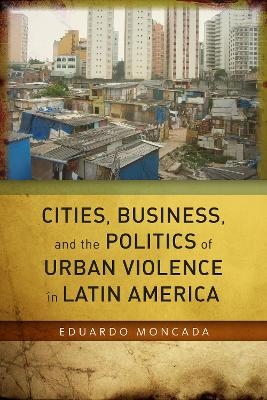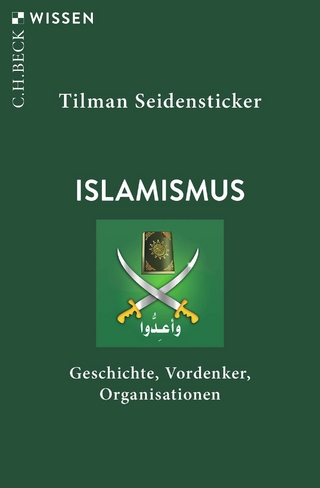
Cities, Business, and the Politics of Urban Violence in Latin America
Stanford University Press (Verlag)
978-0-8047-9417-6 (ISBN)
Eduardo Moncada is Assistant Professor of Political Science at Barnard College–Columbia University.
Contents and Abstracts1Rethinking the Politics of Urban Violence chapter abstractThis chapter outlines the challenges that urban violence poses for development and establishes why existing analytical approaches to this area of study offer limited leverage for explaining the politics of urban violence. To develop a stronger analytic approach the chapter develops a framework in response to three overarching questions: (1) What shapes the preferences of both the private sector and city mayors regarding responses to urban violence? (2) How do distinct types of local government-business relations condition the ability of other political and social actors to influence the politics of urban violence? and (3) How do patterns of armed territorial control that vary in their levels of homicides and coordination in criminal leadership facilitate or constrain distinct types of responses to urban violence? The chapter previews the research design, methodology, and the comparative empirical analyses focused on Colombia's three principal cities: Medellin, Cali, and Bogota.
2Parties, Clientelism, and Violence: Exclusionary Political Order in Colombia chapter abstractThis chapter argues that three inter-related factors explain the historical resilience of exclusionary political order in Colombia. The first is traditional elite party control over state institutions and resources as part of a closed party system. Second is the institutionalization of clientelism as a dominant linkage between citizens and the state. And third is the use of violence as an extension of political competition, a response to threats against the established political order, and a tool for varied armed actors to defend and expand territorial control. By tracing changes in these individual factors as well as the links between them over time, the chapter establishes the broader political context that continues to inform the contemporary politics of urban violence. The discussion shows why political projects in response to urban violence represent valuable opportunities for political, economic, and social actors to preserve and advance their individual interests.
3Medellin: Reshaping Political Order in the World's Most Violent City chapter abstractThis chapter provides a within-case analysis of contrasting outcomes in the politics of urban violence in Medellin. In the early 1990s disengaged relations between local government and business coupled with fragmented armed territorial control derailed the city's first participatory political project in response to urban violence. A decade collaborative relations emerged between business and a local government led by mayor Sergio Fajardo, and territorial control shifted into a monopoly under the authority of a former paramilitary leader. This combination helped to successfully sustain a second participatory political project that was used to rebrand Medellin as an emerging global city. The analysis shows that the reality of the Medellin miracle is far more complex than either its political architects or international donors concede, and is emblematic of the significant ways in which the politics of urban violence can reshape political order in major developing world cities.
4Cali: The Derailment of a Pioneering Participatory Project chapter abstractThis chapter analyzes within-case variation in the institutional outcomes of the politics of urban violence in Cali. In the early 1990s a participatory political project developed by mayor Rodrigo Guerrero was derailed amidst conflictive relations between local government and business along with a pattern of fragmented armed territorial control. Efforts to deepen the political incorporation of marginalized communities and resocialize members of youth gangs were derailed by the interaction between private sector opposition, high levels of lethal violence, and low coordination in criminal leadership. Cali's second participatory project in the early 2000s also faltered when confronted with increased conflict in local government-business relations and escalating homicides amidst further fragmentation in criminal leadership with the arrival of drug trafficking organizations, paramilitaries, and insurgencies into the city. The case of Cali illustrates how conflictive relations and fragmented territorial control can become mutually reinforcing and constrain participatory political projects.
5Bogota: Building and Branding a Global City chapter abstractThis chapter shows that Bogota's first participatory project in response to urban violence emerged out of the surprise electoral victory of Antanas Mockus to the mayor's office. Strong support from the city's business community coupled with the atomized nature of armed territorial control with low lethal violence and limited coordination in criminal leadership sustained Bogota's participatory project. A decade later the election to the mayor's office of a political leftist, Luis Eduardo Garzón, generated tensions between local government and business regarding proposed amendments to the participatory project's stance on public space and informal vendors. The chapter reveals how mutual dependence between the public and private sectors and overall alignment in preferences facilitated compromise on this issue while the continued atomized territorial control shielded the mayor against criticism. Today Bogota is considered a model of urban governance in the developing world.
6The Politics of Urban Violence: Comparisons and Next Steps chapter abstractThis chapter develops cross-case analyses of the politics of urban violence in Colombia to highlight how the variables and mechanisms identified in the analytic framework yield insights into the nature and trajectory of political projects in response to violence across cities. The chapter explores the generalizability of the framework's core dimensions through a brief analysis of the case of Ciudad Juarez, Mexico, where drug trafficking-related violence has increased in recent years. The analysis finds support for three key elements of the framework: (1) business is a pivotal actor in the politics of urban violence, (2) clientelism shapes political preferences regarding responses to urban violence, and (3) patterns of armed territorial control influence the fortunes of political projects in response to violence. The chapter concludes by outlining next steps in the study of urban violence and, more broadly, urban politics in the developing world.
| Erscheint lt. Verlag | 6.1.2016 |
|---|---|
| Zusatzinfo | 16 tables, 12 figures |
| Verlagsort | Palo Alto |
| Sprache | englisch |
| Maße | 152 x 229 mm |
| Gewicht | 476 g |
| Themenwelt | Sozialwissenschaften ► Politik / Verwaltung ► Politische Theorie |
| Sozialwissenschaften ► Politik / Verwaltung ► Vergleichende Politikwissenschaften | |
| Sozialwissenschaften ► Soziologie | |
| ISBN-10 | 0-8047-9417-0 / 0804794170 |
| ISBN-13 | 978-0-8047-9417-6 / 9780804794176 |
| Zustand | Neuware |
| Haben Sie eine Frage zum Produkt? |
aus dem Bereich


